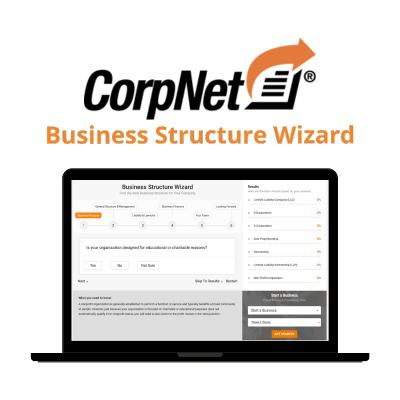Sole Proprietorships are the most popular business structure in the U.S., accounting for 76.2% of all businesses, according to the U.S. Census Bureau. Many entrepreneurs love Sole Proprietorships because they’re simple to start and compliance requirements are minimal. Business income and losses are reported on your personal tax return, meaning that tax requirements are fairly simple. And because you don’t have to file the business with your state, you can avoid registration fees.
While there are many advantages to a Sole Proprietorship, there also are some significant risks you should know about. Let’s start by taking a closer look at what exactly a Sole Proprietorship is and what types of businesses it may be appropriate for.
What is a Sole Proprietorship?
A Sole Proprietorship is a simple business structure in which one person, or a married couple, serves as the sole owner and operator. If you offer a service or product for sale, you are, by default, a Sole Proprietor.
Some entrepreneurs, in fact, become Sole Proprietors with little or no deliberation. If Jayla, who has crafted jewelry and given it as gifts to friends and family for years, decides to take that jewelry to a craft show and sell it, she becomes a Sole Proprietor.
A Sole Proprietorship is not registered with the state, meaning it is unincorporated and, unlike a Limited Liability Company (LLC) or a Corporation, is not considered a formal business entity. As a Sole Proprietor, there’s no legal distinction between you and your business.
While this article deals with Sole Proprietorships, note that a Partnership is basically a Sole Proprietorship with two or more people. Partnerships are not legal business entities, do not have to register with the state or file any paperwork, are taxed the same way as Sole Proprietorships, and generally possess the same advantages and disadvantages.
It’s common for someone to start out as a Sole Proprietor and operate in that capacity until the business has grown, at which point they’ll register the company as a formal business entity. Businesses that are frequently established as Sole Proprietorships include lawn service, personal training, bakery, tutoring, house cleaning, graphic design, electrical, plumbing, painting, home repair and maintenance, freelance writing, catering, and childcare.
What Is the Difference Between Being Self-employed and a Sole Proprietor?
Proclaiming oneself “self-employed” can mean several things. In general, you are considered self-employed if you carry on a trade or a business as a sole proprietor, an independent contractor, a member of a partnership, or are otherwise in business for yourself, even part-time.
A sole proprietor is a business without a legal entity, and all the business activities, including any profits, debts, and actions, belong to the sole proprietor. This means there is no legal separation between the business and owner, and all liabilities belong to the sole proprietor, as well. If your business is sued, for whatever reason, this lack of legal separation puts your personal assets at risk.
What About Paperwork?
While LLCs and Corporations must file paperwork with the state to register and operate, Sole Proprietorships do not. That’s because, as you read, a Sole Proprietorship is not considered a legal entity. Because it’s not registered with the state, a Sole Proprietorship also does not have to file an annual report or other paperwork to remain in compliance.
If you operate the business under your legal name there’s no need to submit any paperwork, but if you want to use a name other than yours, you’ll need to let the state know by filing a Doing Business As (DBA), also known as a fictitious name or trade name. For instance, if Jack Jones starts a cleaning service and wants to call it “On the Spot Cleaning,” he would need to file a DBA with his state. You may also need to file a trademark application with the U.S. Patent and Trademark Office if you want to protect a DBA, logo, or any other design associated with your business.
Depending on requirements and the type of business you operate, you may need to obtain a federal, state, county, or city business permit or license. Licenses are necessary for landscapers, daycare facilities, bakeries, nursery plant dealers, massage therapists, personal trainers, and some other businesses.
Does a Sole Proprietor Need a Business Name?
The minute you start conducting business with the intent to make a profit (as opposed to pursuing a hobby), the state considers your business a sole proprietorship unless you incorporate it. By default, the legal name of your sole proprietorship is your first and last name. If you don’t want to use your name as a business name, then you must file the business name you want to use with the state. This filing is called “Doing Business As (DBA),” a “fictitious name,” or a “trade name.” Depending on the business’s location, filing a DBA begins with the Secretary of State’s office or the county clerk.
Filing a DBA with the state offers the public complete transparency into who the business’s actual owners behind the fictitious name are and provides consumers some protection against unscrupulous or fraudulent companies. For sole proprietors, a DBA allows them to create and use a more marketable business name than their own name and establish a separate professional business identity—without the expense and complexity of incorporating.
Keep in mind, when filing for a DBA, each state has its own set of rules regarding what you can and can’t use in a business name. Sole proprietorships are not incorporated, so you can’t use any business entity identifier, such as “Incorporated,” “Corporation,” or “Inc.” Typically, you cannot imply the business is a governmental unit, such as “Village,” “City,” or “Borough.” You also can’t use anything that is the same or similar to another registered business name in the state.
How Do I Become a Sole Proprietor?
As we stated above, as soon as the company owner begins to conduct business with the intention of making a profit, the sole proprietorship is legally established. However, depending on the type of business you own, there may be other actions you need to take to be compliant, including:
- Registering a DBA with the state if you use a name that’s different than the owner’s name
- Obtaining a business license from your city or county (permission to do business in your location).
- Obtaining other permits and certifications for the business. If a federal agency regulates your business, you most likely need a federal license or permit. Also, specialty service businesses such as salons or accountants need special certifications.
- Does the business require zoning permits? Does it need to be approved by any city, county, or state department, such as the health department?
- If your business sells taxable products or services, you will need to obtain a sales tax license from the state tax authority office. If you’re selling products or services in more than one state, you will need a license from each state. If you plan to sell taxable products on a wholesale basis to retailers, you will need a reseller license (resale certificate), which gives a business permission to sell taxable products without collecting sales tax.
In addition, a sole proprietor’s responsibilities include reporting and paying income and self-employment taxes, withholding and paying payroll taxes (if the sole proprietor hires employees), and renewing any required licenses and permits. If you want to protect a trade name, logo, or any other design associated with your business, you will need to file a trademark application with the U.S. Patent and Trademark Office (USPTO).
Do I Need a Tax ID for a Sole Proprietorship?
According to the IRS, a sole proprietor who does not have employees and doesn’t file excise or pension plan tax returns does not need a Tax ID number or EIN but can get one, if desired. Usually, the sole proprietor’s social security number is used as the Tax ID number for business and personal purposes. However, in some cases, a bank will not allow a business owner to open a business bank account without having a Federal Tax ID number. If the sole proprietor wants to hire an employee, an EIN is needed.
Also, if you have an existing EIN as a sole proprietor and subsequently decide to become an LLC or corporation owner, you will need to get a separate EIN for that business so you can file employment taxes.
How Do I File Taxes as a Sole Proprietor?
Because there is no legal distinction between a Sole Proprietorship and its owner, the business is not taxed separately. As the owner, you simply report business profits or losses on a Schedule C, which is a separate form for business taxes, and file it annually along with your personal income tax form, Form 1040. This method is called pass-through taxation, as business profits or losses are passed through to the owner and taxed at the individual rate. The tax deadline for a Sole Proprietorship is April 15; the same date as personal taxes must be filed.
While pass-through taxation is an easy way to file, a potential disadvantage is that any net income from your business increases your personal taxable income, which could put you into a higher tax bracket.
Sole Proprietors generally must make quarterly estimated tax payments if they expect to owe at least $1,000 when their annual return is filed. You do this by using IRS Form 1040-ES, Estimated Tax for Individuals, and making four payments by specified dates throughout the year.
If you’re a Sole Proprietor, you’ll also need to pay self-employment taxes, using a Schedule SE. While an employer pays half of an employee’s Social Security and Medicare taxes and withholds the other half from the employee’s paycheck, someone who is self-employed is responsible for paying the full amount of both taxes. In 2024, the self-employment tax rate is 15.3% of net earnings (gross income minus business expenses). Having to pay the full amount of these taxes can take a bite out of your earnings.
Most Sole Proprietors don’t hire employees, but it’s not uncommon for them to outsource projects and tasks to independent contractors. If you pay someone more than $600 for their services during a tax year, you’ll need to supply a 1099-MISC form so they can report the income to the IRS. If your Sole Proprietorship plans to hire one or more employees, you’ll need to apply for an employer identification number (EIN), as required by the IRS. Some Sole Proprietors apply for an EIN even if not required to, as having one can be beneficial if you apply for credit or open a business bank account.
What’s the Downside to Sole Proprietorships?
While there are a number of concerns around sole proprietorships, including the tax issues I mentioned earlier, most people consider the biggest downside to be unlimited personal liability for owners. Because there is no legal distinction between the business and its owner, there’s no separation between business and personal assets. If a Sole Proprietorship incurs business debt, such as a bank loan or big bill from a vendor, the owner is fully responsible for paying it. And if someone files a claim or lawsuit against the business, the owner is responsible for that, as well.
If a Corporation or LLC is sued, the company’s business assets are at risk, but the personal assets of the owners are not. In a Sole Proprietorship, however, there’s no legal distinction between personal and business assets and both remain in play in the event of a claim or lawsuit. If business funds are not sufficient to settle a lawsuit, the owner’s personal assets, including bank accounts, house, and vehicles, can be at risk.
Other potential disadvantages to Sole Proprietorships include the following:
- More difficult to raise capital than for an LLC or Corporation
- Limited growth opportunities
- Cannot bring partners into the business
- It can be difficult to sell a Sole Proprietorship
- The business doesn’t continue after the death of the owner
- There’s no paycheck
- Sole Proprietorships are more prone to IRS audits than some other types of business entities
- Perceived lack of professionalism
What Might Be Better Alternatives to Sole Proprietorships?
After reading a little about the potential downsides of Sole Proprietorships, you might be wondering about alternatives. I’ve already mentioned LLCs and Corporations, which are common forms of business entities.
The big difference between them and Sole Proprietorships is that LLCs and Corporations are incorporated. When you incorporate, the business becomes a formally recognized entity by the state in which it’s registered. It’s a legal business entity that exists separately from its owners, protecting the owners’ personal assets if the business. When you incorporate your business, you establish a legal distinction between the entity and yourself.
Other benefits of incorporation include the ability to transfer ownership of the business, flexibility with the number of owners a business can have, the creation of a corporate identity, the ability to build credit and raise capital, and perpetual life for the business.
Related articles: Sole Proprietorship vs. Partnership and Sole Proprietorship vs. LLC and The Pros and Cons of a Sole Proprietorship
Thinking About What’s Right for You
There are advantages and disadvantages associated with every type of business entity, and many factors to consider when deciding which entity or structure is best for you.
If you have started, or are planning to start a Sole Proprietorship, be sure to check with your state, county, and local municipality regarding any registration, business license, or permit laws.
If you’re not sure which business entity makes sense for you, consider your personal situation, your company’s potential for growth, how long you plan to operate the business, whether you’ll want to bring in partners or employees, if you’d like to be able to pass the business along to a family member, and so forth.
Consider your options carefully and, if you’re not certain about what is the best choice, seek the advice of trustworthy legal and tax professionals.

Choosing a business structure can be a tough decision for the new business owner. CorpNet wants to make the process easier.
This free, online tool helps small business owners navigate the process of picking the right business structure for their new business.





